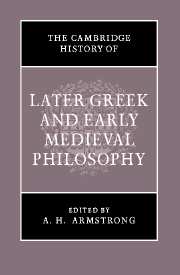Book contents
- Frontmatter
- Chapter 1 Introductory
- Part 1 GREEK PHILOSOPHY FROM PLATO TO PLOTINUS
- Part II PHILO AND THE BEGINNINGS OF CHRISTIAN THOUGHT
- Part III PLOTINUS
- Part IV THE LATER NEOPLATONISTS
- Part V MARIUS VICTORINUS AND AUGUSTINE
- Part VI THE GREEK CHRISTIAN PLATONIST TRADITION FROM THE CAPPADOCIANS TO MAXIMUS AND ERIUGENA
- Part VII WESTERN CHRISTIAN THOUGHT FROM BOETHIUS TO ANSELM
- Chapter 35 Boethius and the legacy of antiquity
- Chapter 36 Development of thought in the Carolingian Empire
- Chapter 37 The debate on philosophical learning during the transition period (900–1080)
- Chapter 38 Anselm of Canterbury: the philosophical interpretation of faith
- Part VIII EARLY ISLAMIC PHILOSOPHY
- Select Bibliography
- Additional Notes and Bibliography
- Index of ancient and medieval works referred to in the text
- General Index
- Index of Greek terms
- References
Chapter 35 - Boethius and the legacy of antiquity
from Part VII - WESTERN CHRISTIAN THOUGHT FROM BOETHIUS TO ANSELM
Published online by Cambridge University Press: 28 March 2008
- Frontmatter
- Chapter 1 Introductory
- Part 1 GREEK PHILOSOPHY FROM PLATO TO PLOTINUS
- Part II PHILO AND THE BEGINNINGS OF CHRISTIAN THOUGHT
- Part III PLOTINUS
- Part IV THE LATER NEOPLATONISTS
- Part V MARIUS VICTORINUS AND AUGUSTINE
- Part VI THE GREEK CHRISTIAN PLATONIST TRADITION FROM THE CAPPADOCIANS TO MAXIMUS AND ERIUGENA
- Part VII WESTERN CHRISTIAN THOUGHT FROM BOETHIUS TO ANSELM
- Chapter 35 Boethius and the legacy of antiquity
- Chapter 36 Development of thought in the Carolingian Empire
- Chapter 37 The debate on philosophical learning during the transition period (900–1080)
- Chapter 38 Anselm of Canterbury: the philosophical interpretation of faith
- Part VIII EARLY ISLAMIC PHILOSOPHY
- Select Bibliography
- Additional Notes and Bibliography
- Index of ancient and medieval works referred to in the text
- General Index
- Index of Greek terms
- References
Summary
The last Roman and the medieval tradition of logical studies
When we try to draw a borderline between antiquity and Middle Ages, in order to define the point where the history of medieval philosophy begins, the work of Boethius comes immediately to our mind. The last Roman and the first schoolman, the two titles with which he is normally introduced, express in their combination clearly his position between the two periods. His link with the Middle Ages is obviously very strong. Translations of two treatises from Aristotle's Organon, his introductions for the beginners and his commentaries and monographs for the advanced student of logic, have deeply influenced the course of medieval thought. In this development the gradual absorption of the Boethian legacy remained an important aspect up to and including the rise of early Scholasticism in the twelfth century. Through all the centuries of the Middle Ages De consolatione philosophiae, the Roman senator's final account with life, was a standard book, stimulating discussions among scholars, and a source of spiritual strength in critical situations. Hundreds of manuscripts, originating from the eighth to the fifteenth century, prove the importance of the Boethian corpus of writings in the libraries of Western and Central Europe.
But the history of his influence in the medieval world shows clearly that the Roman interpreter of Aristotle was not himself a part of it, but rather an intellectual force radiating from a distance. In life and thought Boethius still belonged to Christian antiquity. There is no doubt that he and his contemporaries felt the possibility of the end approaching and certainly such foreboding had a stimulating influence on their studies and literary activities.
- Type
- Chapter
- Information
- Publisher: Cambridge University PressPrint publication year: 1967

